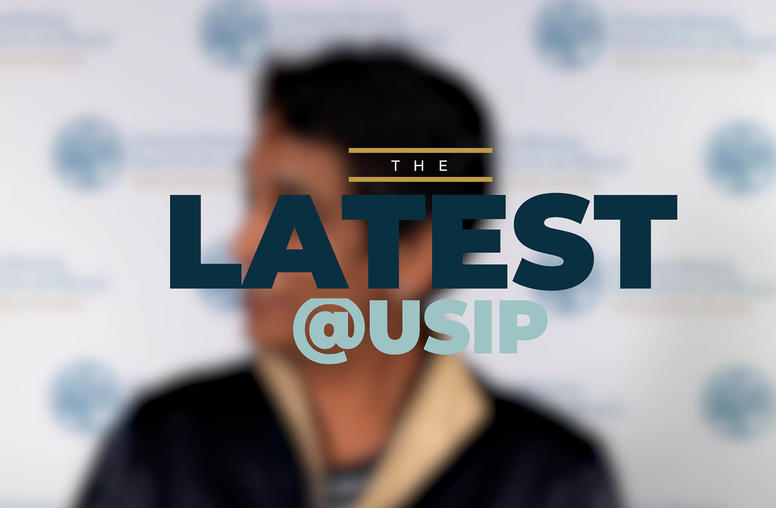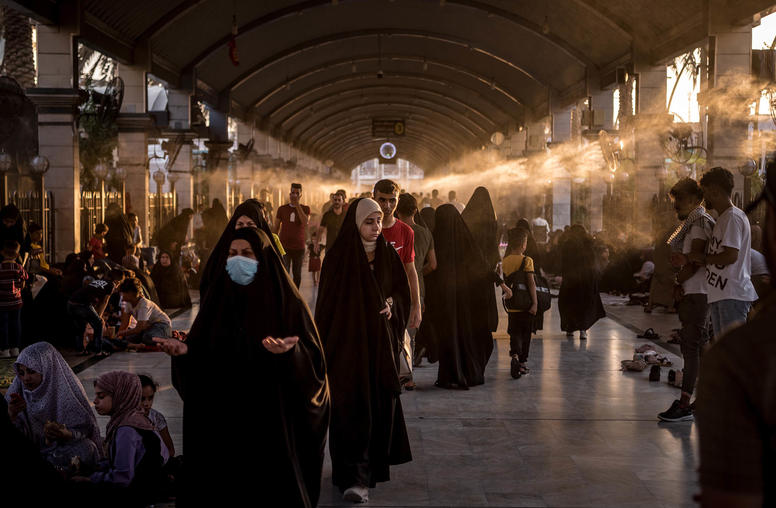PEPFAR’s Profound Legacy 20 Years On
From saving millions of lives to bolstering Africa’s health care infrastructure, PEPFAR demonstrates how the United States can deliver.
This year marks the 20th anniversary of the President’s Emergency Plan for Aids Relief (PEPFAR), the George W. Bush administration’s landmark global health initiative. When Bush announced the initiative during his 2003 State of the Union address, approximately 30 million Africans were infected with HIV/AIDs and had almost no access to treatment. Twenty years later, PEPFAR is estimated to have saved 25 million lives and is credited for helping turn the tide on the global HIV pandemic.

USIP’s Thomas Sheehy, who was a staff member on the House Foreign Affairs Committee when PEPFAR passed, reflects on the initiative’s origins, its legacy 20 years later and how global health programs can help build a more stable world.
Can you reflect on PEPFAR’s origins and how the legislation came about?
Yes, I was the staff director of the Africa subcommittee when the first PEPFAR bill passed in 2003. Twenty years ago, many African countries were being devastated by HIV/AIDS, and there was a strong sense that something had to be done. The committee was charged with reviewing the Bush administration’s PEPFAR proposal, which the president announced at the 2003 State of the Union, and turning it into legislation and ultimately law. Bush’s strong personal commitment to PEPFAR was widely respected and supported.
The committee’s chairman at the time was Henry Hyde, a Republican from Illinois and a senior member of the House who was well regarded by members of both parties. He got along well with the top Democrat on the committee, Tom Lantos of California, another well respected member. They set the bipartisan tone needed to pass significant legislation. The two also were very committed to seeing the United States play a strong role in the world. Traditionally, that meant having a strong U.S. military presence and promoting democracy and human rights overseas. Global health wasn’t a key focus. Then came the HIV/AIDS crisis. From the early 1980s to 2000, HIV/AIDS infection rates skyrocketed in sub-Saharan Africa, going from less than 1% of the continent’s population to 12%. By 2002, the epidemic was raging, with nearly three million people dying worldwide that year. It was so bad in Botswana that some spoke of it literally being wiped out as a nation.
There were hearings, briefings, debates and lots of negotiations behind-the-scenes, the typical process for considering legislation. The high level of funding that the committee was considering authorizing for combatting HIV/AIDs gave some committee members pause. The leadership of Hyde, a fiscal conservative, proved decisive. Ultimately, the committee authorized $15 billion over five years, which was then a large proportion of foreign aid spending. There was debate and negotiation over the role of non-profit and faith-based organizations and other thorny issues. Getting through these issues took a lot of commitment and good faith by committee members and staff.
At the end of the day, the committee advanced a bill to the House floor that passed overwhelmingly with strong Democratic and Republican support. The Senate acted too, and Bush signed the U.S. Leadership Against HIV/AIDS, Tuberculosis, and Malaria Act of 2003 into law. Very soon after, PEPFAR was officially launched in 14 particularly hard-hit countries, including Ethiopia, Mozambique and Botswana.
PEPFAR was one of several bipartisan initiatives focused on Africa that Congress passed around that time. Others included the African Growth and Opportunity Act (2000) and the Millennium Challenge Corporation (2004). These were excellent policy initiatives that continue to make a very positive impact in Africa two decades later. Still, nothing compares to the transformative impact and lives saved by PEPFAR.
What is PEPFAR’s legacy 20 years later?
First and foremost, the legacy is lives saved. The most common estimate is 25 million. I’ll say that again, 25 million lives have been saved through PEPFAR. That makes it one of the most successful public health programs in history. The program supported antiretroviral treatment for 20.1 million people, enabled 5.5 million infants to be born HIV-free and led to 64.7 million people receiving HIV testing services. While these numbers demonstrate a momentous impact, there is still much work to be done. But on the 20th anniversary, this success deserves to be recognized and celebrated.
Let’s consider one country in particular, Zambia, which was one of the hardest hit. The United States has made a very substantial commitment in Zambia. Twenty years ago, the average Zambian lived to age 44. Today, Zambians’ life expectancy is over 62 years, largely because of PEPFAR. That’s a stunning figure, which should make Americans proud at a time when many are skeptical about the United States’ ability to make a positive difference overseas.
PEPFAR affirms the U.S. government’s ability to deliver. The United States has always been a global health leader. Yet PEPFAR has worked better than most anyone thought when it was created. This is because it has been well resourced, well led, has adapted to local conditions including dealing with the stigmatization of those infected, and has been modified when needed. Congress has played a critically important oversight role, focused around PEPFAR reauthorizations in 2008, 2013 and 2018. The U.S. government doesn’t always work this way, making PEPFAR a model. Sure, nothing is perfect, but given the challenges of operating in some of the most impoverished countries in the world, PEPFAR has been hugely impressive.
Another legacy is strengthening the health systems of host countries. PEPFAR invested in critical health infrastructure, including thousands of laboratories and some 70,000 health care facilities worldwide. Through PEPFAR, the United States has trained an estimated 340,000 health care workers. This infrastructure is critical to combatting HIV/AIDs, but other health threats too. The infrastructure built up by PEPFAR helped fight COVID.
Lastly, PEPFAR has been a successful partnership. I mentioned the progress in Zambia. Health infrastructure and programs must be maintained and that costs money. The Zambian government has committed to roughly doubling its expenditure on health, maintaining the momentum in the country. The United States’ and other donors’ efforts have encouraged other governments to invest in the health of their people, which is a very positive development.
How can public health programs like PEPFAR help advance a more peaceful world?
Violent conflict is complex, with each case having unique and multiple drivers. People fight over natural resources. Violent groups take advantage of the lack of employment opportunities to recruit. Cultural and religious divisions can be manipulated to drive conflict. Disinformation on social media is increasingly sparking tension in many countries, with malign actors creating divisions that often lead to violence. Some violent conflict is driven by charismatic and destructive rebel leaders. It’s always a mix of factors, which is what makes conflict resolution so challenging.
Health issues usually aren’t considered as a factor in fostering stability, but they are relevant. People who are in good health are better able to take care of themselves and their families, contributing to greater social stability. Twenty years ago, the HIV/AIDS crisis was destroying economies and bringing communities to their knees, fostering conditions that could lead to violence.
Much conflict in Africa and elsewhere comes about because citizens have no faith in their government. People often feel, with justification, that resources are being poorly spent and stolen or that certain groups are being favored in the distribution of very limited government resources. These tensions can simmer, often for years, and sometimes explode into violent conflict. On the other hand, when governments are delivering desperately needed health services, tensions are lowered.
PEPFAR has increased U.S. standing in many countries, especially in Africa. Africans recognize that PEPFAR was and remains a critical American commitment that has saved many millions of lives — I often hear that when I’m in Africa. If you believe that the United States has a positive role to play in helping resolve conflict overseas, which I do, then this goodwill helps strengthen U.S. diplomats who are trying to resolve insecurity and instability throughout Africa and elsewhere where PEPFAR has saved lives.
In short, PEPFAR is probably a more subtle, less visible contribution to peace and stability compared to other interventions, but it’s significant nonetheless. And it saves lives.



